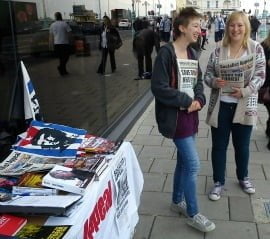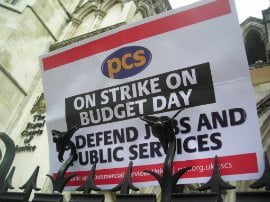Delegates to the annual conference of PCS (Public and Commercial Services Union), the union of the civil servants, met this year in Brighton from the 21st to 23rd of May. At the conference delegates reaffirmed support for the Union’s campaign in opposition to job cuts and attacks on pay, pensions and other terms and conditions of employment. The conference agreed to call for a one-day strike of members by the end of June, probably on the same day as the teaching unions propose to take action.
Delegates to the annual conference of PCS (Public and Commercial Services Union), the union of the civil servants, met this year in Brighton from the 21st to 23rd of May.
At the conference delegates reaffirmed support for the Union’s campaign in opposition to job cuts and attacks on pay, pensions and other terms and conditions of employment. The conference agreed to call for a one-day strike of members by the end of June, probably on the same day as the teaching unions propose to take action. The conference agreed to seek further joint action with other unions.
General strike
However, a Q&A session with PCS President Janice Goodrich at the BIS group meeting prior to the national conference starkly revealed the limits of the union leadership’s current efforts regarding joint strike action. When asked about the progress so far in coordinating jointly with other unions, the answer given by the President was that, having written to other unions to enquire this strategy, the response had been lukewarm at best.
This graphically illustrates the fact that many of the trade union leaders still lag far behind the needs of the members. It would be criminal if the leaders of PCS simply limited themselves to negotiations with other union leaders and not make a direct appeal to the members of those unions to pressurise their leaders for coordinated industrial action, leading to a one-day general strike.
One of the most controversial debates was about whether PCS should talk to the Unite union about a merger. The motions giving the PCS National Executive Committee (NEC) authority to talk to Unite were narrowly carried.
The conference agreed that PCS should continue to affiliate to the Shrewsbury 24 Campaign which seeks justice for the 24 building workers convicted following the 1972 building workers strike. The Campaign is seeking the release of official documents from 1972 which the Government are trying to keep secret. The Campaign believes that these documents detail the cooperation that went on between the Government and the building companies. Prior to the debate the actor Ricky Tomlinson, who in 1972 was a building worker and one of the Shrewsbury 24 who were jailed, spoke at a large and successful fringe meeting.
 The conference also heard how the Government is attacking the ability of the Union to organise. Even under Britain’s restrictive trade union laws, union reps are still entitled to paid time off for collective bargaining, health and safety, and other related reasons. The Government has imposed arbitrary limits to this legal entitlement and are seeking to impose further restrictions. Many delegates had to attend the conference in their own time, some taking part of their holidays. The conference was a day shorter because of this.
The conference also heard how the Government is attacking the ability of the Union to organise. Even under Britain’s restrictive trade union laws, union reps are still entitled to paid time off for collective bargaining, health and safety, and other related reasons. The Government has imposed arbitrary limits to this legal entitlement and are seeking to impose further restrictions. Many delegates had to attend the conference in their own time, some taking part of their holidays. The conference was a day shorter because of this.
In the new National Crime Agency that will be formed on 1 October 2013 out of the Serious Organised Crime Agency, where PCS are recognised, the Government have proposed the establishment of a staff federation to undermine PCS and have removed the right to strike for staff. Conference agreed to campaign against these measures.
Socialist Appeal supporters moved a motion expressing PCS’s solidarity with FIOM metal-workers in FIAT factories in Italy facing Management attacks on their jobs and on their union which was carried overwhelmingly.
Scotland
During last year’s conference it had been agreed that at this year’s conference, PCS would take a position on the Referendum on Independence for Scotland that will take place in 2014. The NEC recommended, however, that further research would be carried out and branches in Scotland would be consulted before a decision would be taken at the 2014 National Conference. This approach was endorsed by the Conference but there was a significant minority who opposed this move.
There was a robust debate on next year’s Scottish independence referendum, with the way still open for the union to make a recommendation to members. Socialist Appeal supporter, and Scottish Government delegate Malcolm Clark, stated his support for working class unity, before going on to argue that the union should be taking on the SNP Scottish Government for following Tory policies, rather than wasting the next year debating over their pet project. However, the conference agreed to hold a special conference for Scottish branches later this year and will decide on a recommendation at next year’s full conference. With many activists in Scotland supporting Scottish nationalism, this raises the concern that the national union may be pushed into a highly divisive position opposed by a majority of the Scottish membership.






